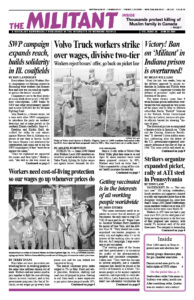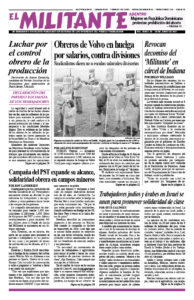Over the last two weeks, bans on the Militant imposed by prison authorities in Indiana and Florida were overturned — important victories for defense of prisoners’ rights and for freedom of the press.
The latest victory came June 9 when Indiana prison authorities overturned the ban imposed on two issues of the paper sent in May to Militant subscriber Kevin “Rashid” Johnson at the Wabash Valley Correctional Facility in Carlisle, because of a photo officials barred for showing “images of guns.”
The historical picture accompanied a feature article in Spanish on “Cuba and the Coming American Revolution.” It showed Cuban militia members celebrating after the defeat of the U.S. government-organized mercenary invasion at the Bay of Pigs in 1961. The same article and photo appeared the previous week in English.
After Militant attorney David Goldstein filed an appeal and working people in the region began sending in letters protesting this violation of the Bill of Rights, Anna Levitt, senior attorney of operations at the Indiana Department of Correction, overturned the ban.
“I agree with you that censoring the ‘images of guns’ is too broad in the context of safety and security of our IDOC facilities,” Levitt wrote to Goldstein. “I believe there is historical significance to the images your newspaper contains, and I will be instructing Wabash Valley Correctional Facility to release the censored newspaper to Offender Johnson.”
Levitt also said that some prison regulations will be rewritten. “A forthcoming Executive Directive will modify the Offender Correspondence Policy to adjust the language to better reflect our intentions,” she wrote. “We intend to restrict censorship only to images that depict violence against persons and animals.”
Johnson is a leader of the New Afrikan Black Panther Party. The Militant has now fought successfully to reverse the impoundment of his subscription three times over the past three years.
“Amnesty International welcomes the reversal of this decision,” Justin Mazzola, a researcher for the organization, told the Militant June 10. “Exclusions such as these without a sufficient demonstration of security risk violates incarcerated individuals’ right to freedom of expression and the U.N. standards on the treatment of prisoners. Having connection to and knowledge of current events and the outside world is crucial for those who will one day be released.”
“I’ve seen this stuff going on for years and years,” George Blue said by phone from Michigan City, Indiana, June 14. “There should be an end to it.” Blue began reading the Militant in prison in the late 1950s. While in prison in the 1970s, Blue waged a successful fight to be able to continue getting it. While some institutions aren’t banning papers, “many more go ahead and take the paper away from prisoners, thinking maybe the guy won’t say anything about it. That’s ridiculous.”
“The victory in Indiana is an important part of the fight to defend the right of workers behind bars to read whatever they want,” said Militant editor John Studer, “and to form their own opinions about what road forward to deal with the deepening capitalist economic and social crisis working people face today.”
The decision follows the overturn of another ban on five issues of the paper by the Florida Department of Corrections last month.
Both sets of impoundments attacked the right of the Militant to present its political point of view.
“We’ll fight to reverse any attempts to ban the Militant for our subscribers behind bars and join with all other defenders of prisoners’ rights in doing so,” Studer said.
Along with Amnesty International, the National Lawyers Guild, PEN America, Reporters Committee for Freedom of the Press, Florida Press Association, American Civil Liberties Union of Florida, union officials and many others have spoken out against prison officials’ bans of the Militant over the years.

